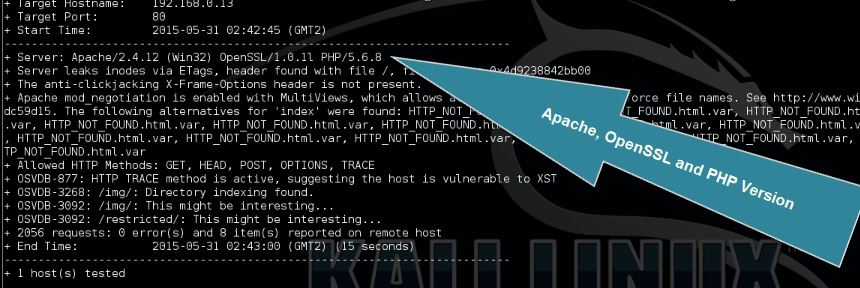Extreme Hacking
Advanced Ethical Hacking Institute in Pune
This tutorial shows you how to scan webservers for vulnerabilities using Nikto in Kali Linux. Nikto is a webserver assessment tool to find potential problems and vulnerabilities very quickly. Nikto comes standard as a tool with Kali Linux and should be your first choice when pen testing webservers and web applications. Nikto is scanning for 6700 potentially dangerous files/programs, checks for outdated versions of over 1250 servers, and version specific problems on over 270 servers as mentioned on the official Nikto website. Nikto comes with the following features:
Features
These are some of the major features of Nikto.
- SSL Support (Unix with OpenSSL or maybe Windows with ActiveState’s
Perl/NetSSL) - Full HTTP proxy support
- Checks for outdated server components
- Save reports in plain text, XML, HTML, NBE or CSV
- Template engine to easily customize reports
- Scan multiple ports on a server, or multiple servers via input file (including nmap output)
- LibWhisker’s IDS encoding techniques
- Easily updated via command line
- Identifies installed software via headers, favicons and files
- Host authentication with Basic and NTLM
- Subdomain guessing
- Apache and cgiwrap username enumeration
- Mutation techniques to “fish” for content on web servers
- Scan tuning to include or exclude entire classes of vulnerability
checks - Guess credentials for authorization realms (including many default id/pw combos)
- Authorization guessing handles any directory, not just the root
directory - Enhanced false positive reduction via multiple methods: headers,
page content, and content hashing - Reports “unusual” headers seen
- Interactive status, pause and changes to verbosity settings
- Save full request/response for positive tests
- Replay saved positive requests
- Maximum execution time per target
- Auto-pause at a specified time
- Checks for common “parking” sites
- Logging to Metasploit
- Thorough documentation
Another nice feature in Nikto is the possibility to define the test using the -Tuning parameter:
0 – File Upload
1 – Interesting File / Seen in logs
2 – Misconfiguration / Default File
3 – Information Disclosure
4 – Injection (XSS/Script/HTML)
5 – Remote File Retrieval – Inside Web Root
6 – Denial of Service
7 – Remote File Retrieval – Server Wide
8 – Command Execution / Remote Shell
9 – SQL Injection
a – Authentication Bypass
b – Software Identification
c – Remote Source Inclusion
x – Reverse Tuning Options (i.e., include all except specified)
Scanning webservers with Nikto
Let’s start Nikto to scan for interesting files using the following command:
nikto -host [hostname or IP] -Tuning 1

Nikto will display the Apache, OpenSSL and PHP version of the targeted webserver. Also it will give you an overview of possible vulnerabilities including the Open Source Vulnerabilities Database (OSVDB) reference. When you search the OSVDB website for the reference code it will explain the possible vulnerability in more detail. The OSVDB project currently covers 120,980 vulnerabilities, spanning 198,973 products from 4,735 researchers, over 113 years.
Run the following command to run all scans against a particular hosts. This might take a while.
nikto -host [hostname or IP] -Tuning 1
www.extremehacking.org
CEHv8 CHFIv8 ECSAv8 CAST ENSA CCNA CCNA SECURITY MCITP RHCE CHECKPOINT ASA FIREWALL VMWARE CLOUD ANDROID IPHONE NETWORKING HARDWARE TRAINING INSTITUTE IN PUNE,Certified Ethical Hacking, Center For Advanced Security Training in India,IT Security Training Information Security Traning Courses in Pune, ceh certification in pune, Ethical Hacking Course in Pune
